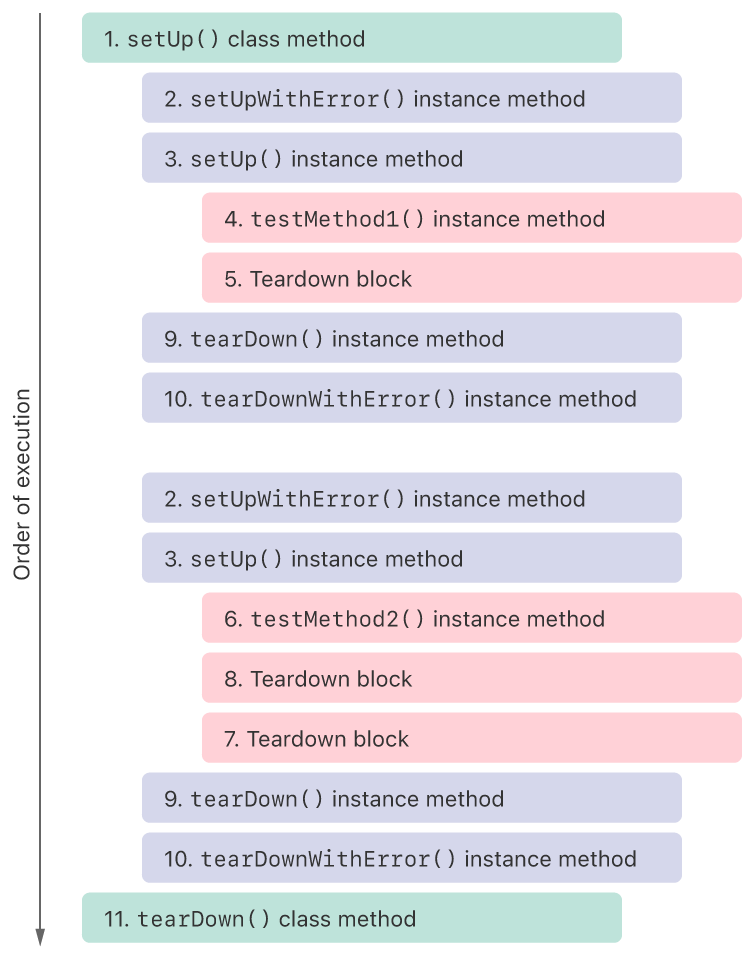XCode XCTest 테스트 메서드 실행 순서 정리
XCTest 프레임워크
Xcode에서 XCTest 프레임워크를 사용하여 테스트를 사용할 때 테스트 순서에 따라 실행되는 메서드가 있습니다. 이 메서드는 테스트 시작 전에 사전 작업을 설정해주거나 테스트가 끝나고 나서 정리하는 작업을 하는 용도로 사용합니다.
테스트를 사용할 때 사용하는 메서드는 다음과 같습니다.
- class func setUp()
- func setUpWithError()
- func setUp()
- func testMethod() & addTestdownBlock(_:)
- func testDown()
- func tearDownWithError()
- class funs tearDown()
위 순서는 테스트가 진행될 때 호출되는 순서로 작성해보았습니다. 차례대로 호출되며 각각 어떤 상황에 호출되는지 살펴보겠습니다.
class func setUp()
이 메서드는 타입 메서드로 테스트 시작 전 딱 한 번만 호출됩니다. 그래서 모든 테스트 메서드에서 실행 전에 정의하거나 초기화할 작업을 오버라이드하여 구현합니다.
func setUpWithError()
이 메서드는 각 테스트 메서드가 실행되기 전에 실행됩니다. 각각의 테스트 메서드 실행 전에 정의하거나 초기화할 작업을 오버라이드하여 구현합니다.
func setUp()
이 메서드는 setUpWithError() 메서드와 동일하게 각 테스트 메서드가 실행되기 전에 실행됩니다. 두 메서드의 차이점은 setUpWithError() 메서드는 실행 도중 발생한 에러를 처리할 수 있다는 점입니다.
func testMethod() & addTestdownBlock(_:)
testMethod() 메서드와 addTestdownBlock(_:) 메서드는 실질적인 테스트를 수행하는 메서드입니다. 꼭 테스트 메서드의 이름을 testMethod로 지을 필요없이 자유롭게 설정할 수 있습니다.
addTestdownBlock(:) 메서드는 testMethod()가 종료될 때 실행되는 코드 블록입니다. addTestdownBlock(:) 메서드 블록은 먼저 선언된 블럭이 나중에 실행되는 LIFO 구조의 방식으로 호출됩니다.
func tearDown()
이 메서드는 각 테스트 메서드가 종료되고 나서 실행됩니다. 각각의 테스트 메서드를 수행하고 정리하는 작업을 오버라이드하여 구현합니다.
func tearDownWithError()
이 메서드는 tearDown() 메서드와 마찬가지로 각 테스트 메서드가 종료되고 나서 실행됩니다. 두 메서드의 차이점은 setUpWithError() 메서드는 실행 도중 발생한 에러를 처리할 수 있다는 점입니다.
class func tearDown()
이 메서드는 타입 메서드로 모든 테스트가 종료되고 딱 한 번만 호출됩니다. 그래서 모든 테스트를 마치고 정리해야 할 작업을 오버라이드하여 구현합니다.
다음 그림은 애플 공식 문서에 있는 테스트 메서드 호출 순서도입니다.

각 테스트 메서드를 호출 순서를 확인할 수 있도록 print() 함수 구문으로 예시를 작성해보았습니다.
import XCTest
@testable import SetUpAndTearDownExample
class SetUpAndTearDownExampleTests: XCTestCase {
override class func setUp() {
// This is the setUp() class method.
// It is called before the first test method begins.
// Set up any overall initial state here.
super.setUp()
print("*** called: override class func setUp()")
}
override func setUpWithError() throws {
// Put setup code here. This method is called before the invocation of each test method in the class.
// This is the setUpWithError() instance method.
// It is called before each test method begins.
// Set up any per-test state here.
try super.setUpWithError()
print("*** called: override func setUpWithError()")
}
override func setUp() {
// This is the setUp() instance method.
// It is called before each test method begins.
// Use setUpWithError() to setu up any per-test state,
// unless you have legacy tests using setUp().
super.setUp()
print("*** called: overried func setUp()")
}
func testMethod1() throws {
// This is an example of a functional test case.
// Use XCTAssert and related functions to verify your tests produce the correct results.
// This is the first test method.
// Your testing code goes here.
print("*** called: func testMethod1()")
addTeardownBlock {
// Called when testMethods1() end.
print("*** called: addTeardownBlock in testMethod1")
}
print("*** called: func testMethod1() after")
}
func testMethod2() throws {
// This is the second test method.
// Your testing code goes here.
print("*** called: func testMethod2()")
addTeardownBlock {
// Called when testMethod2() ends.
print("*** called: addTeardownBlock1 in testMethod2")
}
addTeardownBlock {
// Called when testMethod2() ends.
print("*** called: addTeardownBlock2 in testMethod2")
}
}
override func tearDown() {
// This is the tearDown() instance method.
// It is called after each test method completes.
// Use tearDownWithError() for any per-test cleanup,
// unless you have legacy tests using tearDown().
print("*** called: overried func tearDown()")
super.tearDown()
}
override func tearDownWithError() throws {
// Put teardown code here. This method is called after the invocation of each test method in the class.
// This is the tearDownWithError() instance method.
// Is it called after each test method completes.
// Perforn any per-test cleanup here.
print("*** called: override func tearDownWithError()")
try super.tearDownWithError()
}
override class func tearDown() {
// This is the tearDown() class method.
// It is called after all test methods complete.
// Perform any overall cleanup here.
print("*** called: override class func tearDown()")
super.tearDown()
}
// func testPerformanceExample() throws {
// // This is an example of a performance test case.
// self.measure {
// // Put the code you want to measure the time of here.
// }
// }
}
댓글남기기